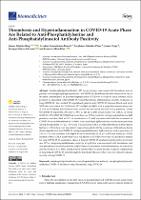| dc.contributor | Vall d'Hebron Barcelona Hospital Campus |
| dc.contributor.author | Anunciación-Llunell, Ariadna |
| dc.contributor.author | Morales-Pérez, Stephanie |
| dc.contributor.author | Trape, Jaume |
| dc.contributor.author | Esteve-Valverde, Enrique |
| dc.contributor.author | Miro-Mur, Francesc A. |
| dc.contributor.author | Alijotas-Reig, Jaume |
| dc.date.accessioned | 2023-09-01T12:43:46Z |
| dc.date.available | 2023-09-01T12:43:46Z |
| dc.date.issued | 2023-08-18 |
| dc.identifier.citation | Alijotas-Reig J, Anunciación-Llunell A, Morales-Pérez S, Trapé J, Esteve-Valverde E, Miro-Mur F. Thrombosis and Hyperinflammation in COVID-19 Acute Phase Are Related to Anti-Phosphatidylserine and Anti-Phosphatidylinositol Antibody Positivity. Biomedicines. 2023 Aug 18;11(8):2301. |
| dc.identifier.issn | 2227-9059 |
| dc.identifier.uri | https://hdl.handle.net/11351/10213 |
| dc.description | COVID-19; Anticuerpos antifosfolípidos; Trombosis |
| dc.language.iso | eng |
| dc.publisher | MDPI |
| dc.relation.ispartofseries | Biomedicines;11(8) |
| dc.rights | Attribution 4.0 International |
| dc.rights.uri | http://creativecommons.org/licenses/by/4.0/ |
| dc.source | Scientia |
| dc.subject | COVID-19 (Malaltia) |
| dc.subject | Trombosi |
| dc.subject | Autoanticossos |
| dc.subject.mesh | Coronavirus Infections |
| dc.subject.mesh | Antibodies, Antiphospholipid |
| dc.subject.mesh | Thrombosis |
| dc.title | Thrombosis and Hyperinflammation in COVID-19 Acute Phase Are Related to Anti-Phosphatidylserine and Anti-Phosphatidylinositol Antibody Positivity |
| dc.type | info:eu-repo/semantics/article |
| dc.identifier.doi | 10.3390/biomedicines11082301 |
| dc.subject.decs | infecciones por Coronavirus |
| dc.subject.decs | anticuerpos antifosfolípidos |
| dc.subject.decs | trombosis |
| dc.relation.publishversion | https://doi.org/10.3390/biomedicines11082301 |
| dc.type.version | info:eu-repo/semantics/publishedVersion |
| dc.audience | Professionals |
| dc.contributor.organismes | Institut Català de la Salut |
| dc.contributor.authoraffiliation | [Alijotas-Reig J] Unitat de Recerca de Malalties Autoimmunes Sistèmiques, Vall d’Hebron Institut de Recerca (VHIR), Barcelona, Spain. Unitat de Recerca de Malalties Autoimmunes Sistèmiques, Servei de Medicina Interna, Vall d’Hebron Hospital Universitari, Barcelona, Spain. Departament de Medicina, Facultat de Medicina, Universitat Autònoma de Barcelona, Bellaterra, Spain. [Anunciación-Llunell A, Miro-Mur F] Unitat de Recerca de Malalties Autoimmunes Sistèmiques, Vall d’Hebron Institut de Recerca (VHIR), Barcelona, Spain. [Morales-Pérez S, Trapé J] Systemic Autoimmune Disease Unit, Internal Medicine Department, Althaia Healthcare University Network of Manresa, Manresa, Catalonia, Spain. [Esteve-Valverde E] Systemic Autoimmune Diseases Unit, Department of Internal Medicine, Hospital Universitari Parc Taulí, Sabadell, Catalonia, Spain |
| dc.identifier.pmid | 37626797 |
| dc.rights.accessrights | info:eu-repo/semantics/openAccess |

 Área privada
Área privada Contacto
Contacto








